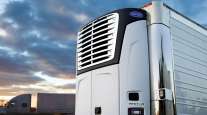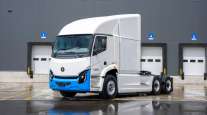Staff Reporter
Panel Discusses the Future of Zero-Emission Trucks

[Stay on top of transportation news: Get TTNews in your inbox.]
SAN DIEGO — Cooperation among stakeholders will be necessary to help propel trucking industry adoption of battery-electric and hydrogen fuel-cell vehicles, experts said.
“Our world is changing as we begin a monumental shift to new technologies,” said Rakesh Aneja, vice president of eMobility at Daimler Truck North America, during an Oct. 23 panel discussion at American Trucking Associations' Management Conference & Exhibition. “It’s the beginning of an entire paradigm shift for our nation, our world and our industry. One that includes a move to complete decarbonization, improved sustainability and, of course, zero-emission trucks.”
He noted that the shift is centered around a move away from a 125-year history from “single source energy” to a variety of emerging options.
“Electric trucks are being delivered to customers now, and hopefully hydrogen trucks are going to follow shortly thereafter. The demand is high and the availability of the new fuel — whether it be electric energy or hydrogen — is a critical item to allow ramp up at scale.”
Also vital is finding applications that make good sense for early adoption, and for which charging infrastructure can be more easily built. He pointed to his company’s battery-electric Freightliner eCascadia as an example of a truck well-suited to a certain duty.
“This generation of truck is extremely well-suited to drayage, pickup and delivery, regional haul and warehouse-to-warehouse applications that are best served by depot charging,” Aneja said. “My company is extremely bullish on the opportunity and our engineers are working feverishly to make that vision a reality. However, the truth is that it’ll take some time for the technology to catch up to the demands of all of our diverse applications.”

Roeth speaks about the motivations driving the adoption of electric vehicles. (Anneliese Mahoney/Transport Topics)
He added that manufacturing volume and scale must also increase to help bring down cost, and acknowledged that zero-emission trucks are not yet at a point where cost of ownership makes sense for all customers.
That said, regulation and customer pressure are also pushing forward wider adoption, noted Michael Roeth, executive director at the North American Council for Freight Efficiency.
“There’s no doubt regulations are driving zero emissions,” he said. “Some stop there and say that’s what’s driving it. We don’t. We see two other significant things driving this. One is sustainability; the consumer demand and the business-to-business demands of being more sustainable in our freight movement is here. I hear from fleet managers all the time that they’re meeting with fleet salespeople [about] how to respond to shippers about this very point.”
Roeth noted that there also is public pressure on companies; environmental, social and governance initiatives are playing a role as companies or their clients devise sustainability plans.
Amid these many factors, companies are also evaluating total cost of ownership implications for zero-emission vehicles.
“Anything that comes out where someone says they’ve done a total cost of ownership calculation of zero-emission trucks — my team is all over it,” Roeth said. “We’re looking at it, we’re trying to figure out what they’re saying, and it goes everywhere from, ‘It’s a slam dunk, they’re cheaper to run than diesel,’ to ‘They’ll never be cheaper to run than diesel.’ ”
For its part, NACFE conducted a study involving 13 electric trucks ranging from Class 3 to Class 8, and found that the benefits depend on application. That said, the operating range of electric trucks is improving, which affects usage calculations.

Pilot's Zobel discusses his company's efforts on alternative fuels. (Anneliese Mahoney/Transport Topics)
“The next generation of trucks, the battery packs are coming,” Roeth said. “We’re looking at optimizing the duty cycles, so how much regenerative braking you do [and] all kinds of other things that can help extend that range, including things that we all know around aerodynamics, the best tires, idle reduction.”
Pilot Co. has been investing to make its chain of travel centers supportive of alternative fuels. Recently it announced an initiative to build a compressed natural gas and hydrogen delivery platform.
“On the infrastructure side, there’s quite a bit of money being pumped into the space right now,” William Zobel, director of alternative fuels at Pilot, said. “You all have undoubtedly heard about the federal government’s Hydrogen Hub program. If you haven’t, I encourage you to look it up. Back last year in December, the federal government injected $9 billion into the production of hydrogen to try to bring the cost of hydrogen down for the consumer.”
Pilot Co. ranks No. 15 on the Transport Topics Top 100 list of the largest private carriers in North America.
Want more news? Listen to today's daily briefing below or go here for more info:





